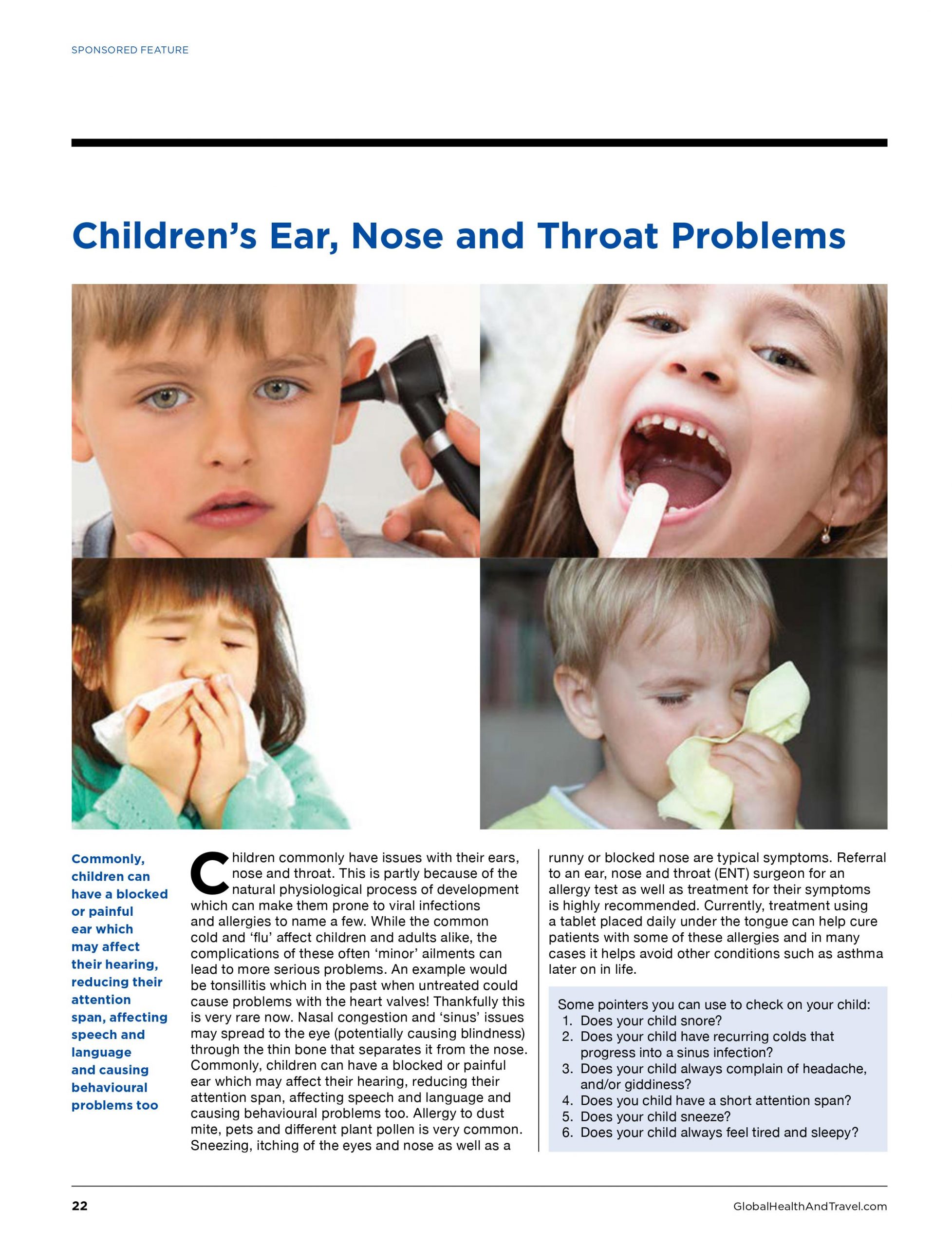Children commonly have issues with their ears, nose and throat. This is partly because of the natural physiological process of development which can make them prone to viral infections and allergies to name a few. While the common cold and ‘flu’ affect children and adults alike, the complications of these often ‘minor’ ailments can lead to more serious problems. An example would be tonsillitis which in the past when untreated could cause problems with the heart valves!
Thankfully this is very rare now. Nasal congestion and ‘sinus’ issues may spread to the eye (potentially causing blindness) through the thin bone that separates it from the nose. Commonly, children can have a blocked or painful ear which may affect their hearing, reducing their attention span, affecting speech and language and causing behavioural problems too. Allergy to dust mite, pets and different plant pollen is very common.
Sneezing, itching of the eyes and nose as well as a runny or blocked nose are typical symptoms. Referral to an ear, nose and throat (ENT) surgeon for an allergy test as well as treatment for their symptoms is highly recommended. Currently, treatment using a tablet placed daily under the tongue can help cure patients with some of these allergies and in many cases it helps avoid other conditions such as asthma later on in life.
Some pointers you can use to check on your child:
1. Does your child snore?
2. Does your child have recurring colds that progress into a sinus infection?
3. Does your child always complain of headache, and/or giddiness?
4. Does you child have a short attention span?
5. Does your child sneeze?
6. Does your child always feel tired and sleepy?
Ear, Nose & Throat Cancer
There are several types of cancers that an ENT and head and neck surgeon manages. They tend to affect adults and generally men who smoke and drink although this is not always the case. Cancers of the back of the nose (Nasopharyngeal cancer, NPC) tend to affect non-smokers and drinkers of Chinese ethnicity more than other populations. These cancers can be screened for in high risk groups. They present without much warning – with pain or bleeding being uncommon symptoms. A lump in the neck, blocked nose and blocked ears with some hearing loss may be the initial complaint. Quick referral to an ENT surgeon is strongly advised to assess the back of the nose with a special video telescope known as a nasendoscope.
Biopsies and scans may be necessary thereafter. Other cancers such as tonsillar (oropharyngeal) cancer are becoming more common partly due to a viral driven pathway – the human papilloma virus (HPV). Patients may present with an enlarged tonsil, swallowing issues or a neck lump. They tend to be younger and the condition is not caused by smoking and alcohol. Thyroid cancers are commoner amongst younger women and have a good prognosis usually. Surgery is the main treatment and in some cases it is done in combination with radio-iodine treatment.
Salivary tumours are rare. They are also treated surgically as the main management option. These tumours can affect the ‘major’ glands but are more aggressive in the minor ones that are dotted all over our oral cavity and throat. Any lump that is new within the mouth or neck should therefore be investigated if it does not regress or disappear after a fortnight or so.
Hearing Loss
Hearing loss affects the young and old. Childhood hearing loss can be due to genetic causes or birth issues. Certain drugs can also cause hearing loss. The commonest causes in children tend to be less serious and usually improve and disappear as the child develops. Often, the cause is a developing Eustachian tube which is short and less angled compared to an adult. Blockage or failure to clear mucus in the middle ear results in hearing loss which can also cause ear infections. Large adenoids (lymphoid structures similar to tonsils) can act as physical barriers to the opening of the Eustachian tubes and be a nidus for infection too. Surgery can help treat these conditions and is commonly performed in recalcitrant cases.
Age-related hearing loss is becoming a global concern as research continues to demonstrate its link with dementia. Many elderly patients become socially isolated and are not provided with the right recommendation for treatment – be it hearing aids or even cochlear implants. As the hearing begins to weaken, other functions take over the hearing centre in the brain creating a situation where the hearing areas of the brain do not ever recover from. Early referral to an audiologist and ENT surgeon is recommended.
